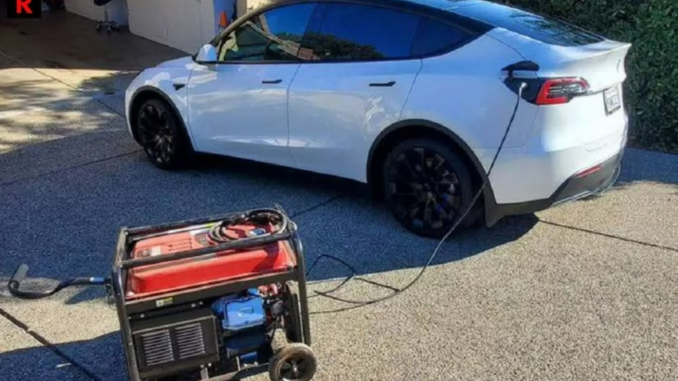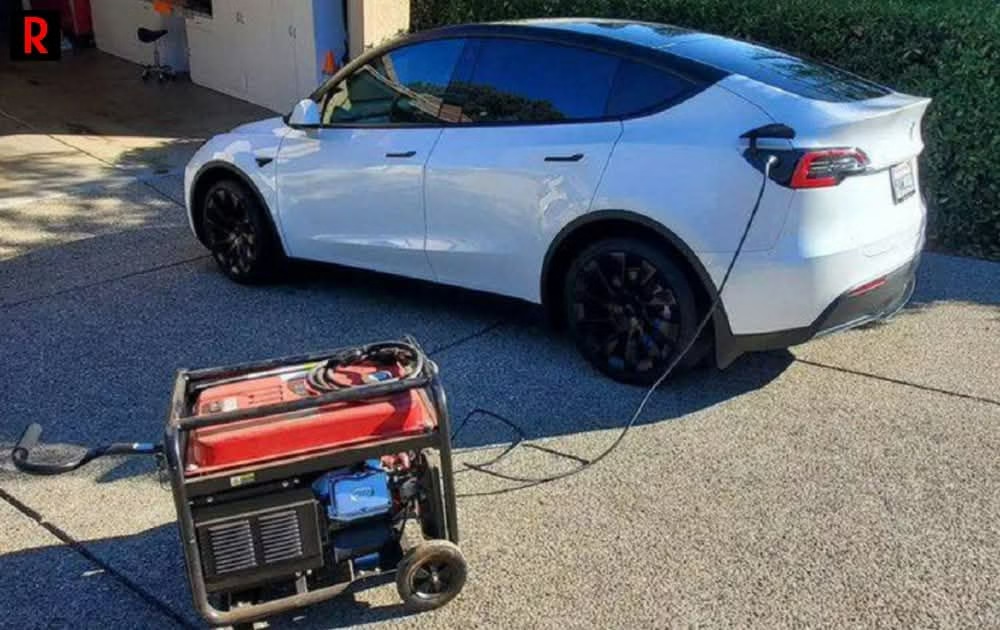
With the increasing adoption of electric vehicles (EVs), the need for accessible charging solutions has become a hot topic. While home chargers and public charging stations are the preferred methods for replenishing an EV’s battery, some EV owners consider using portable generators as a backup charging option. But is it really a good idea to charge an EV with a generator? Let’s explore the feasibility, challenges, and best practices involved.

Why Would You Consider Charging an EV with a Generator?
There are several scenarios where an EV owner might consider using a generator for charging:
- Emergency Situations – In case of a power outage or when stranded in a remote area, a generator could serve as a temporary charging solution.
- Off-Grid Travel – If you’re traveling in rural areas without charging stations, a generator could provide a backup power source.
- Event-Based Needs – If you participate in outdoor events, camping, or long road trips, a generator might be a way to keep your EV charged.
- Lack of Home Charging Infrastructure – Some people without access to home charging stations might consider a generator as an alternative.
While these reasons seem valid, using a generator to charge an EV comes with significant challenges and limitations.
Key Challenges of Charging an EV with a Generator
1. Power Output Limitations
Most EVs require a significant amount of power to charge efficiently. A typical home Level 2 charger provides around 7.2 kW to 11 kW of power, whereas many portable generators only produce 2 kW to 5 kW. This means charging an EV with a small generator could take an extremely long time.
2. Compatibility Issues
Not all generators are compatible with EV chargers. Many EVs require a stable sine wave AC output, which is not always provided by lower-quality generators. If the generator does not produce clean electricity, it might not work properly with the EV’s onboard charger.

3. Fuel Consumption and Efficiency
Using a gasoline or diesel-powered generator to charge an EV seems counterintuitive, as it still relies on fossil fuels. The efficiency is also questionable – burning fuel to generate electricity to then charge a battery leads to energy losses at multiple stages.
4. Environmental Concerns
One of the main reasons for switching to an EV is to reduce carbon emissions. Running a gasoline or diesel generator negates this benefit by releasing emissions into the atmosphere. If sustainability is a priority, using a generator is not the best solution.
5. Charging Speed
Due to limited power output, a generator may take upwards of 24 hours to provide a significant charge to an EV battery. For example, a 2 kW generator would take over 30 hours to fully charge a standard 60 kWh battery, making it impractical for daily use.
Best Practices for Charging an EV with a Generator
If you decide to use a generator for EV charging despite the challenges, consider the following best practices:

1. Choose the Right Generator
Opt for an inverter generator with a clean sine wave output to ensure compatibility with EV charging systems. A generator with at least 5 kW output is recommended to make charging feasible.
2. Use a Level 1 Charger
A Level 1 charger (120V) is more likely to work with a generator, though it will be very slow. Avoid trying to power a Level 2 charger unless the generator has sufficient capacity.
3. Check for Stability and Safety
Ensure the generator is placed on a stable surface, well-ventilated, and away from flammable materials. Always use proper grounding and follow the manufacturer’s guidelines to prevent power surges or electrical hazards.
4. Monitor Fuel Usage
Since gasoline or diesel generators consume fuel quickly under heavy loads, plan accordingly and carry extra fuel if necessary. However, be mindful of storage and fire safety risks.
5. Consider Solar Generators or Battery Backup Systems
If charging an EV off-grid is a frequent need, investing in a solar generator or a battery backup system like a Tesla Powerwall might be a more sustainable option.
Alternative Backup Charging Options
Instead of using a traditional fuel-powered generator, consider these alternatives:
- Portable Power Stations – High-capacity battery packs can provide emergency charging without emissions or fuel consumption.
- Solar Charging Solutions – While slow, solar panels combined with battery storage can help provide a sustainable backup charging method.
- DC Fast Charging Stations – Some remote locations now feature off-grid solar-powered DC fast chargers.
Conclusion: Is It Worth It?
While charging an EV with a generator is technically possible, it is not an efficient or sustainable solution. The drawbacks, including slow charging speeds, high fuel consumption, and environmental concerns, make it a last-resort option rather than a practical backup. If you frequently find yourself in situations where off-grid charging is necessary, investing in a solar-powered generator or a larger battery backup system would be a more effective solution.
For most EV owners, planning trips carefully, utilizing available charging networks, and having contingency plans for emergencies will always be a better strategy than relying on a generator. However, in extreme cases where no other options are available, a properly sized inverter generator can serve as a temporary fix.
Would you consider using a generator to charge your EV? Let us know your thoughts in the comments below!

Leave a Reply